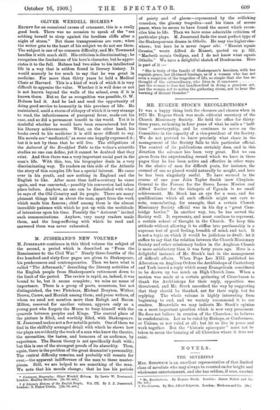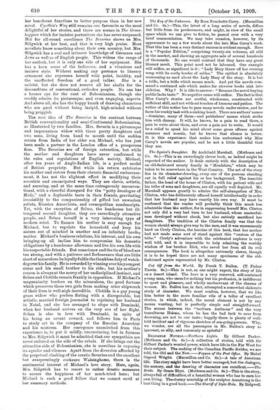NOVELS.
SEVERINS.t
BIBS. SIDGWICK is an excellent representative of that limited class of novelists who may always be counted on for bright and wholesome entertainment, and she has seldom, if ever, exerted
• My Recollections. By Eugene Stock. London : James Nisbet and Co. [8s. net.] t The Se-series. By Mrs. Alfred Sidgwick. London : Methuen and Co. [6s.]
her beneficent functions to better purpose than in her new novel. Cynthia's Way still remains our favourite as the most delightful of her stories, and there are scenes in The Grass- hoppers which for incisive portraiture she has never surpassed. But for all-round excellence The Severins shows us Mrs. Sidgwick at her best, and that is very high praise. Most novelists know something about their own country, but Mrs. Sidgwick has a real and intimate knowledge of Germans and Jews as well as of English people. This widens the range of her outlook, but it is only one side of her equipment. She has a keen sense of the ludicrous, and a vivacious and incisive style. Without making any pretence to literary ornament she expresses herself with point, lucidity, and the unaffected freedom of a good talker. She is a satirist, but she does not reserve all her shafts for the discomfiture of conventional, orthodox people. No one has a keener eye for the cant of Bohemianism, though she readily admits its picturesque, and even engaging, aspects. And above all, she has the happy knack of drawing characters who are good without being insipid, high-minded without being priggish.
The root idea of The Severins is the contrast between British conventionality and semi-Continental Bohemianism, as illustrated by two families. Mrs. Severin is a picturesque and impecunious widow with three pretty daughters and two sons, living from hand to mouth until the sudden return from India of her elder son Michael, who has just been made a partner in the London office of a prosperous firm. The Severins are of foreign extraction, but while the mother and daughters have never conformed to the rules and regulations of English society, Michael, after ten years of Anglo-Indian life, is a perfect model of British propriety. But while his return extricates his mother and sisters from their chronic financial embarrass- ment, it has not the slightest effect in modifying their eccentric and emancipated ways. They are clever, artistic, and amusing, and at the same time outrageously unconven- tional, with a cheerful disregard for the "petty decalogue of Mode," and a deplorable taste in their friends, gravitating irresistibly to the companionship of gifted but unwashen artists, Russian Anarchists, and cosmopolitan nondescripts. Yet, with the exception of Selma, the handsome but ill- tempered second daughter, they are exceedingly attractive people, and Selma herself is a very interesting type of modern rebel. To finance his mother is easy enough for Michael, but to regulate the household and keep his sisters out of mischief is another and an infinitely harder matter. Michael's business relations, his interest, and his own bringing-up all incline him to compromise his domestic obligations by a handsome allowance and live his own life with his respectable friends. But conscience and the tie of blood are too strong, and with a patience and forbearance that are little short of miraculous he loyally fulfils the thankless duty of watch- dog over his family. He is rewarded by winning over laisyoungest sister and his small brother to his side ; but his mother's reason is always at the mercy of her undisciplined instinct, and Selma and Clotilda remain frankly in opposition. If Michael's magnanimity borders on the miraculous, the good fortune which preserves these two girls from making utter shipwreck of their lives is well-nigh incredible. Clotilda is a gay young grass widow who prefers flirting with a disreputable, but artistic, married foreign journalist to rejoining her husband in Natal, and she has arranged to elope with Deminski, when her husband arrives on the very eve of her flight. Selma is also in love with Deminski, in spite of his being an arrant coward, and follows him to Paris to study art in the company of the Russian Anarchist and his mistress. Her emergence unsmirched from this experience is, to put it mildly, unconvincing, but in fairness to Mrs. Sidgwick it-must be admitted. that. our sympathies are never enlisted on the side of the rebels. If she brings out the attractive side of Bohemianism, she is merciless in exposing its squalor and vileness. Apart from the diversion afforded by the perpetual clashing of the erratic Severins and the excellent but exasperatingly cocksure Walsinghams, there is the sentimental interest of Michael's love story. Here, again, Mrs. Sidgwick has to resort to rather drastic measures to secure the happiness of her much-tried hero ; but Michael is such a good fellow that we cannot cavil at her summary methods.















































 Previous page
Previous page